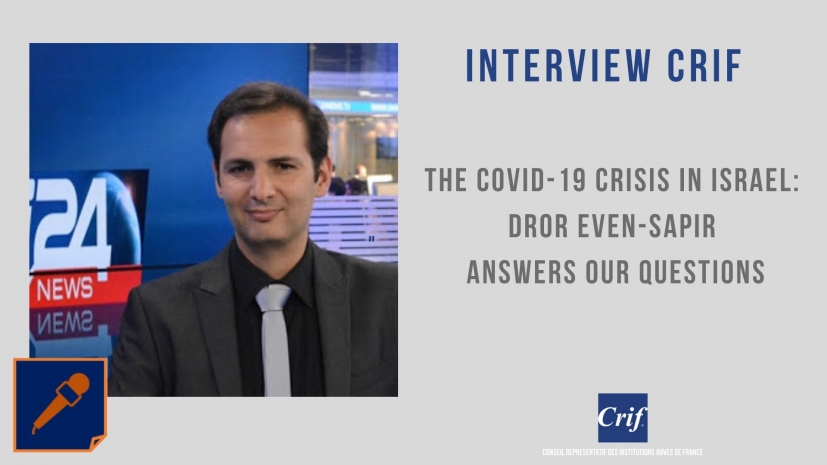 English
English Français
Français
News
|
Published on 22 April 2020
Interview Crif - The Covid-19 crisis in Israel: Dror Even-Sapir answers our questions

Interview by Marie-Sarah Seeberger published on Crif Website on April 1st, 2020.
Le Crif - For several weeks, long before most European countries, Israel has imposed a very strict quarantine and the closing of borders. How can we explain the seriousness with which the crisis was treated?
Dror Even-Sapir - There was, in fact, an Israeli specificity in the way of managing the crisis, and the slowing down of the rate of contaminations observed in recent days could be the consequence of the severity of the measures taken by the authorities, and, even more, their relative precocity.
We could venture to list three levels of explanation to understand the nature of the reaction of the Israeli authorities. The first, the most obvious, is linked to taking into account the sociological and cultural specificities of the country. Israel is a very densely populated country, especially in the center and the coastal area, where almost 80% of the population live. A fertile ground, it is easily understood, for the propagation of epidemics. Just as can be another characteristic, positive in normal times: the importance of community and family structures in the daily life of many Israelis.
Second level of explanation: Israeli expertise in security, and border control. Some see it as a real obsession, but the concern for national security and the skills acquired in this area probably played a central role in the decision-making process initiated from the earliest times of the health crisis.
Finally, and this is more a personal interpretation than a proven fact, it is not impossible that the promotion of the preservation of all human life in Jewish and Israeli culture was present, consciously or not.
"Part of the ultra-Orthodox" communities continues to cause great concern"
Le Crif - What were the Israelis' reactions to these measures? Is compliance with lockdown more difficult in certain communities in Israel?
Dror Even-Sapir - The majority of Israelis reacted with understanding and discipline to the instructions of social distancing and confinement. No more than elsewhere, and certainly less than in Asian countries, but at the moment, there have been a very few cases of incivism.
That said, the behavior of some of the "ultra-Orthodox" communities continues to be of great concern. The figures speak for themselves: one in two Israelis hospitalized because of Covid-19 contamination belongs to this sector of population, and in the city of Bnei Brak, one in three people was tested positive for the virus!
The reasons for this disproportion are well known. The "haredim" generally have a limited or no access at all to the mainstream media and social networks, so information about the pandemic only partially and belatedly reached them. In addition, the intensity of community life and the large number of children per household made it particularly difficult to comply with the confinement instructions. Finally, the rabbinical authorities took a long time to measure the gravity of the situation.
Le Crif - What are the health measures implemented today with regard to religious practice in Israel?
Dror Even-Sapir - For the first time in the history of the country, the synagogues have closed their doors... Weddings and brit-mila ceremonies are however authorized, but with a reduced number of participants, respectively twenty and ten, and of course with an obligation to respect the guidelines for social distancing.
Two important religious holidays are approaching for the Israelis, that of Passover for the Jews and that of Rammadan for the Muslims. It is asked to celebrate them only in the presence of only members of the family home, and to avoid visiting the elderly on this occasion. The police have already announced that they will strengthen their presence to avoid possible rallies.
Le Crif - A few days ago, the UN welcomed the coordination between the Israeli and Palestinian authorities in the response to the COVID-19 pandemic. Health material distributed, authorization to enter and exit medical aid in Gaza: in concrete terms, what are we talking about?
Dror Even-Sapir - First of all, there is a particularly intense and almost permanent communication and information exchange system between the Israeli and Palestinian health authorities. Some Israeli doctors who have acquired real expertise in the fight against the epidemic have trained several of their Palestinian counterparts.
In addition, Israel has provided the Palestinian Authority with several hundred screening kits and an equivalent quantity of masks.
It is too early to conclude that this cooperation, has been successful. Only this is a certain fact: the joint mobilization of the two peoples is essential, and it is in the interest of both the Israelis and the Palestinians.
Dror Even-Sapir is a journalist and diplomatic analyst on i24news
